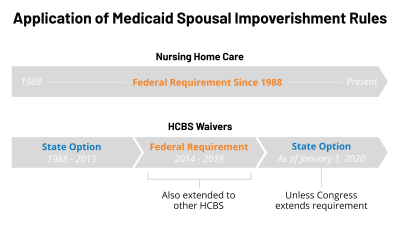 Implications of the Expiration of Medicaid Long-Term Care Spousal Impoverishment Rules for Community Integration
Issue Brief
Implications of the Expiration of Medicaid Long-Term Care Spousal Impoverishment Rules for Community Integration
Issue Brief
To financially qualify for Medicaid long-term services and supports (LTSS), an individual must have a low income and limited assets. In response to concerns that these rules could leave a spouse without adequate means of support when a married individual needs LTSS, Congress created the spousal impoverishment rules in 1988. Originally, these rules required states to protect a portion of a married couple’s income and assets to provide for the “community spouse’s” living expenses when determining nursing home financial eligibility, but gave states the option to apply the rules to home and community-based services (HCBS) waivers.
Section 2404 of the Affordable Care Act (ACA) changed the spousal impoverishment rules to treat Medicaid HCBS and institutional care equally from January 2014 through December 2018. Congress subsequently extended Section 2404 through December 2019. This issue brief answers key questions about the spousal impoverishment rules, presents 50-state data from a 2018 Kaiser Family Foundation survey about state policies and future plans in this area, and considers the implications if Congress does not further extend Section 2404.